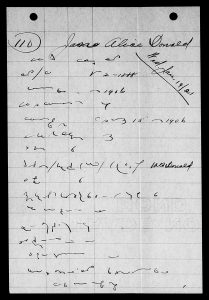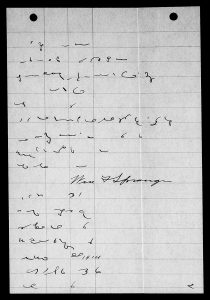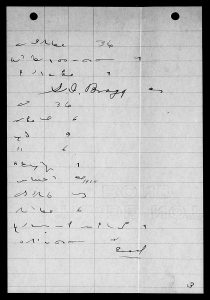Can you read shorthand? I certainly cannot.
Shorthand testimony was taken in regards to the naturalization of Jane Alice Donald in Adams County, Illinois, in 1921. The material appears with other loose naturalization-related documents from Adams County, Illinois.
It’s not often I discover this much shorthand in a record–let alone an entire record written in shorthand. It serves as a reminder that we can easily encounter handwriting we cannot read in virtually any record–even when most of other materials are written in a script with which we are familiar.
I’m not related to Jane. I merely stumbled across this item while searching for something else. It is located in “Naturalization related papers, cases 1-414, ca. 1830-1918” from Adams County, Illinois, as micofilmed by FamilySearch.
Information about this item:
- direct link to first image on FamilySearch
- catalog entry for the entries from which this item was located on FamilySearch




6 Responses
I do read shorthand but this is apparently a 19th century version of it. I do recognize some of these “words.”
How fun
Thanks, for sharing.
Lisa Dayley
Looks like Gregg that my Mom knew. I took Thomas and can only read that.
Well I can top this. My grandfather, who was born 1867 in Vienna, received a postcard (1905ish) written entirely in shorthand – presumably German shorthand. I’ve posted and no one has been able to “translate” it yet…
Well that’s really interesting. Have you posted it to the German translation groups on Facebook?
I was a shorthand teacher in the 1970’s, but I found it very difficult to attempt to read this shorthand. I would guess that, as someone else said, it is from the earlier 1900s. I still use shorthand for all my note taking, but since I wrote it, I can also read it! Very interesting to find that shorthand was used in a legal document.
I read my Gregg shorthand but everyone has their own way – just like handwriting. I caught a glimpse of a few words which leads me to believe it is a version of Gregg, but I still couldn’t make sense of it. Very interesting though.
— Debbie Golding